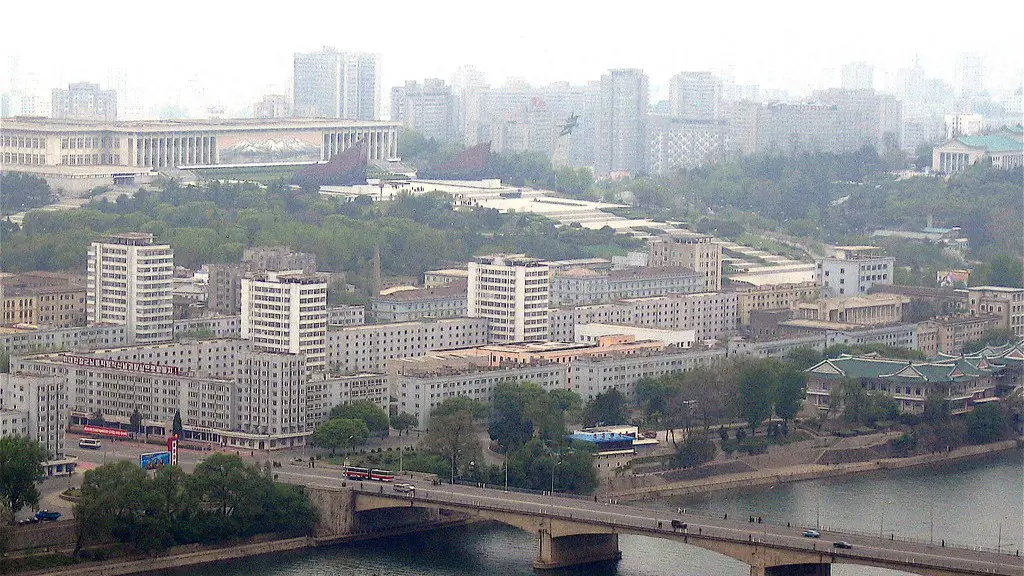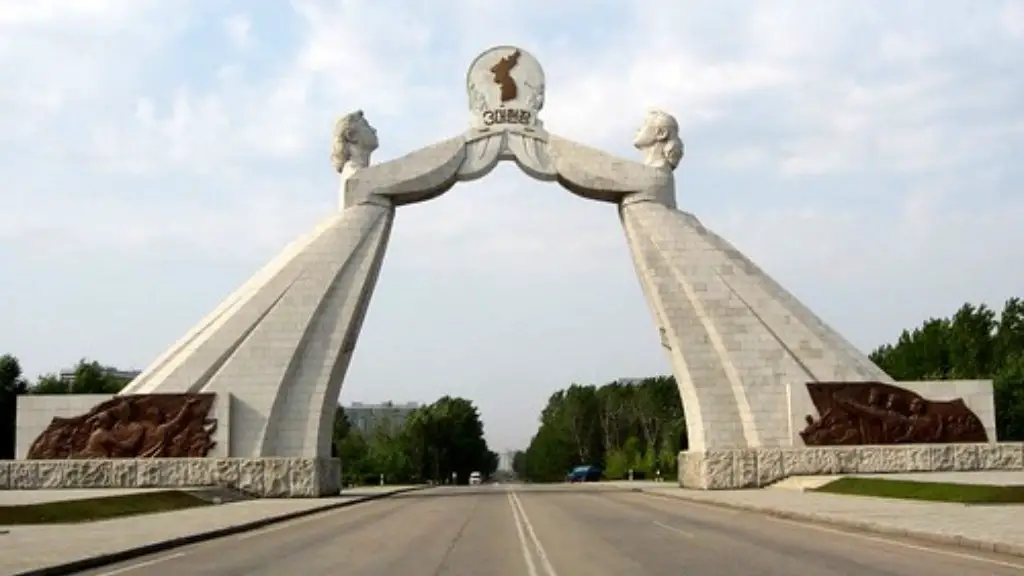Background Information and Motivations of North Korea’s Aggression
The relationship between North Korea and the Western world has been strained for generations due to its isolationist foreign policy and pursuit of developing nuclear weapons. It is an oppressive regime, ruled by an authoritarian leader, Kim Jong Un, who has declared his commitment to maintaining the country’s independence. North Korean leaders are prepared to use military force to protect their territorial integrity and isolate themselves from external interference. This has led to an icy relationship between them and the international community, and led to the United Nations Security Council imposing extensive sanctions against North Korea in 2006.
In recent years, North Korea has become even more provocative and has adopted increasingly hostile rhetoric against its perceived enemies. The country regularly threatens South Korea, Japan, and the United States with nuclear destruction. North Korea has also been known to engage in cyber warfare and cyber espionage, posing a threat to the international community.
In his 2017 New Year’s address, Kim Jong Un declared the development of an intercontinental ballistic missile capable of delivering a nuclear warhead to the United States, making it one of the few countries in the world with the capability to deliver a nuclear weapon to another country. This has raised tensions in the region, and has made the North Korean regime a serious threat to international security.
Identifying North Korea’s Enemies
The United States has been identified by North Korea as being its main enemy, due to its long-term challenge to the regime and its open criticism of its human rights violations. North Korea often refers to the US as its “principal enemy,” and has declared in its state-controlled media that the US is the main target of their nuclear weapons.
South Korea is also referenced as an enemy of North Korea due to its ties to the US and its close proximity. North Korea has repeatedly threatened to attack South Korea and has engaged in numerous military provocations in the past. In 2016, North Korea conducted its fifth nuclear test, drawing strong condemnation from South Korea.
Japan is another enemy of North Korea and has been subjected to numerous threats and provocations by the regime. North Korea has been suspected of conducting several cyberattacks against Japan in 2017, and ballistic missiles fired by the North have been known to fly over the country. North Korea’s testing of nuclear bombs and long-range missiles in the Sea of Japan is also seen as a provocation by the Japanese government.
Why the US is the Enemy of North Korea
The US is by far the biggest enemy of North Korea due to their long history. The US has imposed sanctions on North Korea since the 1950s, punishing it for its human rights abuses, weapons of mass destruction program, and other menacing activities. In addition, the US has a strong military presence in the region, including in South Korea and Japan, making it an attractive target for North Korean aggression.
President Donald Trump has also taken a hard-line stance against North Korea and has threatened the regime with the “fire and fury” of the US military if it continues to pursue its nuclear program. Trump’s rhetoric has only increased tensions between the two countries, which some analysts view as a dangerous escalation of the situation.
The US has also been a vocal critic of North Korea’s human rights abuses. In 2017, the UN Commission of Inquiry on Human rights in the Democratic People’s Republic of Korea found that the regime had committed a number of serious human rights violations, including murder, torture, enforced disappearances, and repression of political opponents.
The US is also a strong ally of South Korea and a key backer of its security. The US and South Korea have a mutual defense treaty, and the US has pledged to help defend the South if it is attacked by North Korea. This relationship has angered the North Korean regime, as it views US support for South Korea as a threat to its own security.
International Reactions to North Korea’s Provocations
The international community has condemned North Korea’s provocations and has expressed its concern about the stability of the region. The UN Security Council has imposed a number of sanctions against North Korea in response to its nuclear tests and other hostile acts. These sanctions have been criticized by North Korea, which views them as a violation of its sovereignty.
In addition, the US, South Korea and Japan have accelerated their military exercises in an effort to deter North Korea from further provocations. The US has also deployed its THAAD missile defense system in South Korea, with the aim of protecting the country from potential North Korean attacks.
Despite increasing international pressure, North Korea has remained defiant and has continued to threaten its enemies. In October 2017, the country conducted its sixth and most powerful nuclear test, prompting the UN Security Council to further tighten the sanctions imposed against it.
The Normative Impact of North Korea’s Aggressions
North Korea’s provocations have a serious normative impact on the international system, as they challenge the global order and threaten international peace and security. North Korea’s refusal to abide by international norms and its violations of international law have caused concern for many countries, as it could potentially spark a military confrontation in the region.
In addition, North Korea’s provocations have the potential to undermine international nuclear non-proliferation efforts and complicate the issue of nuclear disarmament. The North Korean regime has long sought to acquire nuclear weapons in order to gain international recognition, and its nuclear tests pose a challenge to global non-proliferation efforts.
The situation in North Korea has also raised serious questions about the effectiveness of international sanctions in deterring threats to international peace and security. North Korea has been under international sanctions for decades, yet the regime continues to defy the international community and pursue its nuclear program.
The Potential for War between North Korea and its Enemies
The ongoing tensions between North Korea and the international community has raised fears of a potential war, particularly if the North Korean regime continues to pursue its nuclear weapons program. The US and its allies have made it clear that they will not tolerate a nuclear armed North Korea, and have expressed their willingness to use military force to deter the regime from further provocations.
However, a war between North Korea and its enemies is not inevitable, as it is still possible for tensions to be resolved through diplomatic means. Many world leaders have expressed their hope that a peaceful solution can be reached, and that North Korea and the international community can come to a peaceful agreement.
At the same time, the North Korean regime has proven to be unpredictable and capable of responding to international pressure with aggression. It is therefore important for the international community to remain vigilant and for all sides to strive for a diplomatic solution to the conflict.
The Economic Impact of North Korea’s Conflict
North Korea’s ongoing conflict with the international community has had a detrimental effect on the country’s economy, as International sanctions have crippled its ability to engage in international trade and attract foreign investment. In 2017, North Korea’s gross domestic product shrunk by 3.5 percent, and inflation is estimated to be as high as 30 percent.
The sanctions imposed by the international community have also made it difficult for North Korea to acquire much-needed food, medical supplies, and other essentials. This has had a devastating effect on the country’s citizens, who are now vulnerable to famine and disease.
The conflict has also had a major impact on the economies of North Korea’s neighbors. South Korea and Japan have been adversely affected by the sanctions and have had to endure the costs of increased military spending in response to North Korean provocations.
Alternatives for Disputing Conflicts with North Korea
In light of the current situation between North Korea and the international community, there is a need for alternative approaches to resolving the conflict. Many countries have advocated for direct talks between North Korea and the US, as well as a return to the Six-Party Talks involving China, Japan, Russia, South Korea, and the US. It is hoped that these talks could lead to a peaceful solution to the conflict and pave the way for a more stable and secure region.
Some non-governmental organizations have also advocated for a soft power approach to resolving the conflict, highlighting the importance of strengthening diplomatic ties with North Korea, providing humanitarian assistance, and increasing cultural exchanges between North Korea and the rest of the world. This approach has been met with scepticism by some, as the North Korean regime has proven to be resistant to change.
At the same time, the international community must remain vigilant and prepared to respond if North Korea crosses a red line. North Korea must be made to understand that any aggression or provocation will be met with severe consequences.





